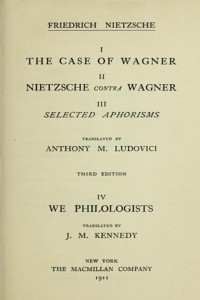On Moods

Let the reader imagine me sitting at home, wrapped in a dressing gown, on the evening of the first day of Easter. A fine rain is falling outside, and I am alone in the room. I stare for a long time at the blank sheet of paper lying in front of me, pen in hand, vexed by the confused crowd of things, events, and thoughts all demanding to be written down. Some of them are tempestuous in their demands, being young still and effervescent like new wine; but in opposition to these many an old, ripened, clarified thought arises, like an old master who surveys the strivings of the youthful world with an equivocal eye. Let us say it openly: our temperament is conditioned by the conflict between these old and new worlds, and the current situation of the conflict is what we call ‘mood’ or also, with some disdain, ‘temper’.
Like a good diplomat I rise above the quarreling parties and describe the state of the commonwealth with the impartiality of a man who every day attends inadvertently the sessions of all the parties, applying in practice the very principle that he mocks and scorns from the rostrum.
Let us admit it: I am writing about moods, insofar as I am right now in a certain mood; and it is fortunate that I am just in the mood for describing moods.
Today I played Liszt’s Consolations many times over, and now I feel how its tones have penetrated my being and continue, spiritualized, to resonate within me. I recently underwent a painful experience that had to do with a parting or a not-parting, and now I notice how this feeling and those tones have fused together, and I see that the music would not have appealed to me had I not just had this experience. So the soul strives to attract what is like it, and the current mass of feelings squeezes like a lemon the new events that impinge upon the heart, but always in such a way that only a part of what is new fuses with what is old, and a residue is left over which is not yet able to find anything related to it in the household of the soul, and thus lodges here alone, quite often to the displeasure of the older residents with whom it often comes into conflict. But look! Here comes a friend, there a book is opening, a girl passes by. Listen! Music! Already new guests are streaming in from all sides into the house that stands open to all, and the one who was just now standing alone finds many noble relatives.
Friedrich Nietzsche - Фридрих Ницше - فريدريش نيتشه
 العربية
العربية Español
Español  Deutsch
Deutsch  Français
Français  Русский
Русский  Italiano
Italiano  English
English 






